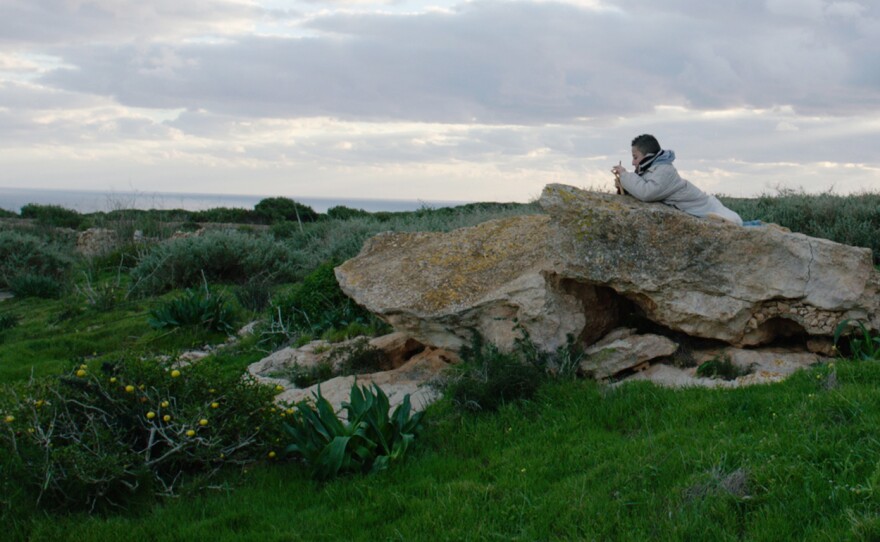If any image haunts TV news, and perhaps our conscience, it's the seemingly ceaseless river of migrants seeking refuge from war, dictatorship and poverty. These desperate souls inspire pity, fear and election-year arguments about whether to offer them welcome or keep them out.
Not surprisingly, many artists feel compelled to confront this refugee crisis. But the big question is: How do you engage a humanitarian tragedy without haranguing the audience or laying on a guilt trip? You get different but complementary answers in two prize-winning new works from Europe. One is an observational documentary, the other a quasi-mythic novel.
Gianfranco Rosi's ravishingly shot Fire at Sea takes place on the tiny, unglamorous Sicilian island of Lampedusa, 70 miles from the coast of Africa. Year after year, tens of thousands of migrants turn up on disastrously overcrowded boats. So many come that the UN has an entire hazmat-suited system for handling them — they're rescued at sea, cleaned up, photographed, handed gold-foil survival blankets and put in holding camps before being shipped to the mainland.
Rosi cuts between these newly arrived refugees and an impressionistic look at the islanders. For the locals, another boatload of refugees is basically something they hear about on the radio between golden oldies, like the one that gives this film its title.
The newcomers don't affect the locals' daily round of cooking, scuba-diving or working as fishermen. Yes, there is one heroic doctor who helps the migrants and is outraged at the world's apathy — I salute you, Pietro Bartolo — but he's exceptional in every sense.
The island's true exemplar is Samuele, a smart, naughty, but decent pre-teen who practices the slingshot and pulls words out of his tight-lipped relatives as if he were their therapist. While Samuele enjoys a happy, stable life, he is not without problems that feel a bit, well, metaphorical. He has a lazy eye that limits his vision and a gnawing anxiety he can't explain, although maybe we can, because we know what's happening in the background of his life.
Without ever saying it, Rosi suggests that Samuele is, like most of the West, cut off from the refugees' pain. Indeed, even as Fire at Sea moves us with the refugees' vulnerability, it shows how their tragedy has become normalized. It's been so folded into the routine of life in Lampedusa that folks scarcely notice it.
You get a very different approach to the refugee situation in These Are the Names, a taut novel by the acclaimed Dutch writer Tommy Wieringa, which possesses a symbolic sweep that recalls J.M. Coetzee's Waiting for the Barbarians. Set in the former Soviet empire, the book also weaves two storylines, yet Wieringa's point differs from that of Fire at Sea.
One of the stories centers on a boy who joins a small group of migrants traveling to the West from the republics of Central Asia. Abandoned in the middle of nowhere by crooked human traffickers, this rag-tag group — which includes a poacher, a small-time crook and a defenseless woman — begins a grueling, dog-eat-dog trek across a no man's land that's every bit as harsh as Cormac McCarthy's The Road.
Wieringa juxtaposes their story to that of Pontus Beg, a lonely, 53-year-old cop in the imaginary city of Michailopol who feels that his life and his society have become unmoored. This starts to change when Beg investigates the death of a local rabbi and uncovers truths about his own origins he never dreamed of. As the refugees make their journey across the landscape, Beg journeys into the past — and into his own identity.
Unlike Fire at Sea, the two different realities in the novel intersect. I won't give away what happens, but I will say that, unlike Samuele and his fellow islanders, Beg is pushed out of his comfort zone in a way that opens him to life. Reading the biblical Book of Exodus — the novel's title comes from its opening line — he realizes that these straggling migrants are living out a universal story about the search for the promised land.
Taken together, Fire at Sea and These Are the Names offer us a two-step course in feeling empathy. Where Rosi suggests we must stop cloistering off the refugees' reality and acknowledge their presence as part of our lives, Wieringa reminds us that the refugees' desire to find a safe, nurturing place to call home doesn't make them unspeakably alien. It makes them just like us.
Copyright 2016 Fresh Air. To see more, visit Fresh Air.






